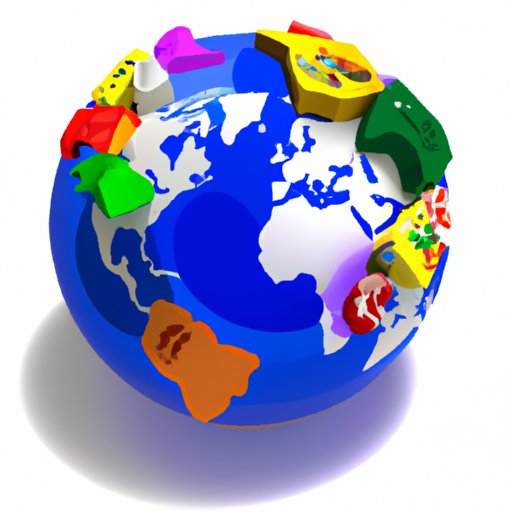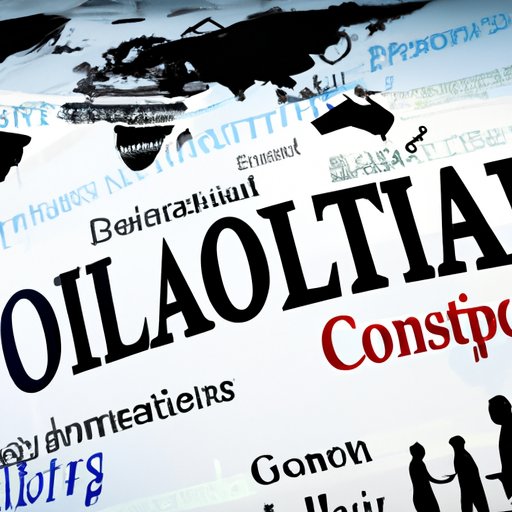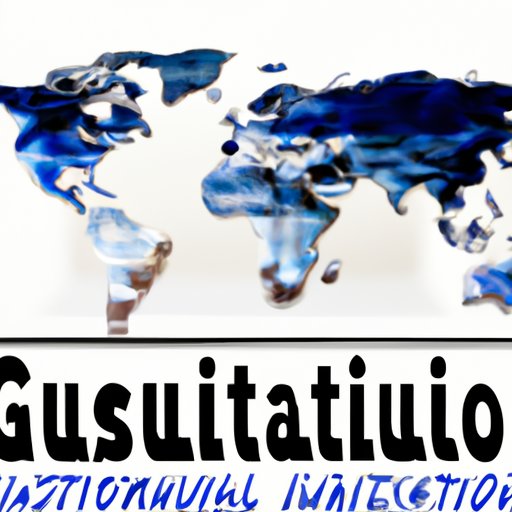Introduction
Globalization is a term that refers to the process of increased interconnectedness between countries, cultures, and economies around the world. As the world becomes more connected, the effects of globalization are being felt in many different areas, including politics, economics, and culture. Globalization culture is a term used to describe the impact that globalization has had on culture, including changes in language, values, beliefs, customs, and practices.
In this article, we will explore the definition of globalization culture, the impact of globalization on cultural identity, understanding the benefits and challenges of globalization culture, exploring the role of technology in globalization culture, examining how globalization has changed our world, analyzing the effects of globalization on traditional cultures, and investigating the role of multinational corporations in globalization.

The Impact of Globalization on Cultural Identity
Globalization has had a profound impact on cultural identity. The interconnectedness of nations, cultures, and economies has led to the emergence of a global culture, with shared values, beliefs, and customs. This has resulted in an increased homogenization of culture, with people around the world becoming more alike in terms of their values, beliefs, and practices.
One of the most significant impacts of globalization on cultural identity is the rise of multiculturalism. As people from different countries, cultures, and backgrounds interact more, they have become more exposed to different beliefs, customs, and practices. This has resulted in a greater appreciation for diversity and an increased acceptance of different cultures.
Technology has also played a major role in shaping cultural identity. The internet and social media have enabled people from all over the world to connect and share ideas, values, and beliefs. This has resulted in a greater exchange of information and knowledge, which has enabled people to learn about different cultures and develop a greater understanding of them.
Understanding the Benefits and Challenges of Globalization Culture
Globalization culture has both advantages and disadvantages. On one hand, globalization has opened up opportunities for increased trade and economic growth, as well as providing access to new markets and technologies. It has also enabled people to experience different cultures, which can lead to greater understanding and appreciation of diversity.
On the other hand, globalization culture can lead to a loss of cultural identity and a homogenization of culture. It can also lead to the exploitation of natural resources, as well as the displacement of local people and communities. Additionally, globalization can result in increased inequality, as some countries benefit more than others from increased economic activity.

Exploring the Role of Technology in Globalization Culture
Technology has played a major role in facilitating global communication and increasing the interconnectedness of nations, cultures, and economies. The internet and social media have enabled people to connect and share ideas, values, and beliefs, which has resulted in a greater exchange of information and knowledge. Additionally, technology has enabled multinational corporations to expand their operations, resulting in increased economic activity and job creation.
Technology has also enabled people to experience different cultures, as well as access goods and services from around the world. For example, people can now watch movies and television shows from different countries, and access products from different parts of the world without ever leaving their homes. This has resulted in an increased appreciation and understanding of different cultures and customs.

Examining How Globalization Has Changed Our World
Globalization has had a profound impact on the way people interact and live their lives. It has changed the way we communicate, as people are now able to connect and share ideas, values, and beliefs with people from all over the world. Additionally, globalization has had a significant impact on economics, politics, and social structures, as countries have become increasingly interconnected and reliant on each other.
Globalization has also led to an increase in mobility, as people are now able to travel more easily and access goods and services from around the world. This has led to an increased awareness of different cultures, as well as a greater appreciation for diversity.
Analyzing the Effects of Globalization on Traditional Cultures
Globalization has had a significant impact on traditional cultures, as people from different countries, cultures, and backgrounds have become increasingly interconnected. This has resulted in an increased exchange of information and knowledge, as well as an increased appreciation and understanding of different cultures.
However, globalization has also had a negative impact on some traditional cultures. For example, some cultures have been displaced or assimilated into mainstream culture, while others have lost their traditional customs and practices due to increased exposure to different cultures. Additionally, some cultures have been exploited for their natural resources, leading to environmental degradation.
Exploring the Pros and Cons of Globalization Culture
Globalization culture has both advantages and disadvantages. On one hand, globalization has opened up opportunities for increased trade and economic growth, as well as providing access to new markets and technologies. It has also enabled people to experience different cultures, which can lead to greater understanding and appreciation of diversity.
On the other hand, globalization culture can lead to a loss of cultural identity and a homogenization of culture. It can also lead to the exploitation of natural resources, as well as the displacement of local people and communities. Additionally, globalization can result in increased inequality, as some countries benefit more than others from increased economic activity.

Investigating the Role of Multinational Corporations in Globalization
Multinational corporations have played a major role in shaping globalization. These companies have expanded their operations to multiple countries, enabling them to access new markets and take advantage of lower labor costs. Additionally, multinational corporations have been able to leverage their financial and political power to influence governments and shape policies.
Multinational corporations have also had an impact on culture, as their presence has enabled people from different countries, cultures, and backgrounds to interact more. This has resulted in an increased exchange of information and knowledge, as well as an increased appreciation for diversity.
Conclusion
In conclusion, globalization culture has had a significant impact on culture, including changes in language, values, beliefs, customs, and practices. There are both advantages and disadvantages to globalization culture, as it can lead to increased economic activity and job creation, but also to a loss of cultural identity and exploitation of natural resources. Additionally, technology has played a major role in facilitating global communication and shaping cultural identity, while multinational corporations have had an impact on globalization and culture.
Overall, globalization has had a profound impact on the way people interact and live their lives, and it has enabled people to experience different cultures and develop a greater understanding and appreciation of diversity. While there are both advantages and disadvantages to globalization culture, it is clear that it has had a significant impact on the world.
(Note: Is this article not meeting your expectations? Do you have knowledge or insights to share? Unlock new opportunities and expand your reach by joining our authors team. Click Registration to join us and share your expertise with our readers.)
